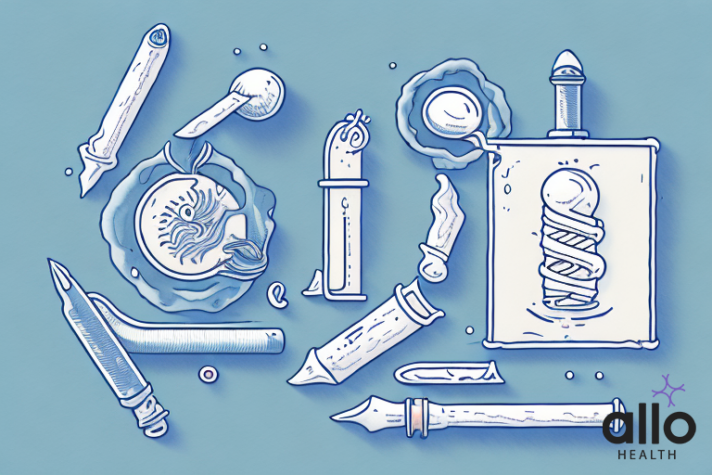Syphilis Chancre Creams: Treating The Condition

Allo Health is dedicated to personalized well-being, offering support and trusted information tailored to individual health goals. The platform emphasizes human-generated content, led by a distinguished medical team of experts, including physicians and sexual health specialists. Their commitment to credibility involves rigorous fact-checking, authoritative research, and continuous updates to ensure accurate, up-to-date information. Allo Health's unique approach goes beyond conventional platforms, providing expert-led insights and a continuous commitment to excellence, with user feedback playing a crucial role in shaping the platform's authoritative voice.

Dr. Raj. R holds an undergraduate medical degree from the Philippines, and has a bachelors background in Psychology. His experience working in the field of urology further brought his interest forward in working towards his passion of understanding the science of attraction, intimacy, sex and relationships. A key motto he practices by remains unprejudiced and non-judgemental care.
Why This Was Upated?
Our experts continually monitor the health and wellness space, and we update our articles when new information became available.
Updated on 28 January, 2024
- Article was updated as part of our commitment to diversity, equity, and inclusion.

"The following blog article may discuss medical treatments and interventions. However, it is important to note that the information provided is for general educational purposes only and should not be considered as a substitute for professional medical advice, diagnosis, or treatment. Always seek the guidance of a qualified healthcare professional for personalized medical advice.
Book consultation
Medical treatments are complex and should be tailored to individual circumstances. The information presented in this blog may not be applicable to everyone, as each person's medical condition, history, and needs are unique. Only a qualified healthcare professional can evaluate your specific medical situation, consider relevant factors, and provide appropriate recommendations for diagnosis, treatment options, and monitoring.
It is crucial to note that self-diagnosis, self-medication, or relying solely on the information provided in this blog for treatment decisions can have serious health consequences. "
Syphilis is a sexually transmitted disease (STD) that can cause a variety of serious health complications if left untreated. One of the hallmark symptoms of syphilis is the formation of a painless sore known as a chancre. While a chancre can occur anywhere on the body, it is most commonly found in the genital area. Fortunately, there are effective treatments available for syphilis chancre, including the use of creams.
What Is Syphilis?
Syphilis is a sexually transmitted infection (STI) caused by the bacterium Treponema pallidum. It can also be transmitted from an infected mother to her unborn child during pregnancy. Syphilis has several stages, each with distinct symptoms, and it can affect various organs and systems in the body if left untreated.
Stages of Syphilis:
- Primary Syphilis:
- This stage typically begins with the appearance of a painless sore or ulcer called a chancre. The chancre usually appears at the site where the bacterium entered the body, often on or around the genitals, anus, or mouth.
- The sore is highly contagious, and the bacteria can be spread through direct contact with the sore during sexual activity.
- Secondary Syphilis:
- If the primary stage is not treated, the infection progresses to the secondary stage.
- Symptoms may include skin rashes, mucous membrane lesions, and flu-like symptoms such as fever, fatigue, sore throat, and swollen lymph nodes.
- Secondary syphilis can also affect the eyes, causing inflammation and vision concerns.
- Latent Syphilis:
- If the infection is not treated during the secondary stage, it enters a latent stage where there are no visible symptoms, but the bacteria are still present in the body.
- Latent syphilis can last for years, and during this time, the infection can progress to the tertiary stage in some cases.
- Tertiary Syphilis:
- Tertiary syphilis can occur years after the initial infection and can be very serious, affecting organs such as the heart, brain, nerves, and bones.
- Symptoms may include gummas (soft, non-cancerous growths), cardiovascular complications, and neurological concerns.
Diagnosis and Treatment:
- Diagnosis: Syphilis can be diagnosed through blood tests that detect antibodies produced in response to the infection. The presence of T. pallidum can also be confirmed through dark-field microscopy or polymerase chain reaction (PCR) testing.
- Treatment: Syphilis is typically treated with antibiotics, most commonly penicillin. The choice of antibiotic and the duration of treatment depend on the stage of the infection.
Prevention:
- Safer Sex Practices: Using condoms consistently and correctly during sexual activity can reduce the risk of syphilis and other STIs.
- Regular Screening: Regular STI testing, especially for individuals at higher risk, is essential for early detection and treatment.
Syphilis is a serious health concern due to its potential to cause long-term complications if not promptly treated. It is crucial for individuals who suspect they may have syphilis or have been exposed to the infection to seek medical attention for proper diagnosis and treatment.
Symptoms And Causes For Syphilis
Symptoms of Syphilis
- Primary Syphilis:
- Chancre: A painless sore or ulcer at the site of infection (genitals, anus, mouth).
- The chancre is highly contagious, and it typically appears 10 to 90 days after exposure.
- Secondary Syphilis:
- Skin Rash: Red or brown rash that may occur on the trunk, extremities, palms, or soles of the feet.
- Mucous Membrane Lesions: Sores in the mouth, vagina, or anus.
- Flu-like Symptoms: Fever, fatigue, sore throat, swollen lymph nodes, headaches, and muscle aches.
- Latent Syphilis: No visible symptoms, but the infection is still present in the body.
Tertiary Syphilis: Symptoms depend on the organs affected and may include:
-
- Gummas: Soft, non-cancerous growths that can form on the skin, bones, and other tissues.
- Cardiovascular Complications: Affecting the heart and blood vessels.
- Neurological concerns: Such as paralysis, sensory deficits, and dementia.
Causes and Transmission
Bacterium Treponema pallidum: Syphilis is caused by the bacterium Treponema pallidum, a spirochete.
- Transmission:
- Sexual Contact: The most common mode of transmission is through direct sexual contact with an infected person. This can occur during vaginal, anal, or oral sex.
- Vertical Transmission: An infected mother can pass the infection to her unborn child during pregnancy, leading to congenital syphilis.
- Risk Factors:
- Unprotected Sex: Not using condoms during sexual activity increases the risk of transmission.
- Multiple Sexual Partners: Having multiple sexual partners increases the likelihood of coming into contact with an infected person.
- Men who have sex with men (MSM): This group is at higher risk.
- Syphilis and HIV: Having syphilis can increase the risk of acquiring or transmitting HIV.
Diagnosis and Testing:
- Blood Tests: Blood tests are commonly used to detect antibodies produced in response to the infection.
- Dark-Field Microscopy: This technique involves examining a sample (usually from a chancre) under dark-field illumination to directly visualize the spirochetes.
- Polymerase Chain Reaction (PCR): PCR tests can detect the genetic material of the bacterium.
Treatment:
- Antibiotics:
- Penicillin is the preferred antibiotic for treating syphilis.
- The choice of antibiotic and the duration of treatment depend on the stage of the infection.
Prevention:
- Safer Sex Practices: Consistent and correct use of condoms during sexual activity can reduce the risk of syphilis and other STIs.
- Regular Screening: Routine STI testing, especially for individuals at higher risk, helps with early detection and treatment.
Understanding the symptoms, causes, and risk factors of syphilis is crucial for prevention, early detection, and timely treatment to prevent long-term complications. If you suspect you have syphilis or have been exposed to the infection, it’s important to seek medical attention for proper testing and treatment.

What Is A Syphilis Chancre?
A syphilis chancre is a painless sore or ulcer that is characteristic of the primary stage of syphilis. It is the first visible sign of syphilis infection and typically appears at the site where the bacterium Treponema pallidum entered the body through direct sexual contact. The chancre is a crucial diagnostic feature of syphilis.
Characteristics of a Syphilis Chancre:
- Painless: One of the distinctive features of a syphilis chancre is that it is usually painless. This lack of pain can contribute to delayed recognition and treatment.
- Appearance: The chancre typically appears as a single, well-defined, round or oval-shaped sore. It is often firm and raised.
- Location: The location of the chancre depends on the site of initial infection. Common locations include the genitals, anus, mouth, or other areas of direct sexual contact.
- Timing: The chancre usually develops within 10 to 90 days (average around 21 days) after exposure to the syphilis-causing bacterium.
- Highly Contagious: The fluid from the chancre contains a high concentration of the infectious organism, making the sore highly contagious. Transmission can occur through direct contact with the chancre during sexual activity.
Diagnosis:
- Clinical Examination: Healthcare providers can often diagnose syphilis based on the appearance of the chancre during a physical examination.
- Laboratory Tests: Confirmation of syphilis is typically done through laboratory tests, such as blood tests that detect antibodies produced in response to the infection.
Importance of Early Detection and Treatment:
- Preventing Progression: Treating syphilis at the chancre stage is crucial to prevent the progression of the infection to the secondary and tertiary stages, which can lead to severe complications affecting various organs.
- Reducing Transmission: Timely treatment of the chancre reduces the risk of transmitting the infection to sexual partners.
- Preventing Congenital Syphilis: In pregnant individuals, treating syphilis during the primary stage is essential to prevent the transmission of the infection to the unborn child, which can result in congenital syphilis.
It’s important for individuals who notice any unusual sores, particularly painless sores, in the genital, anal, or oral areas to seek medical attention promptly. Syphilis is a treatable infection, and early detection and treatment are crucial for a positive outcome and to prevent the spread of the disease.
All Treatments Available For Syphilis
The primary treatment for syphilis is antibiotics. The choice of antibiotic and the duration of treatment depend on the stage of the infection. Penicillin is the preferred and most commonly used antibiotic for syphilis. Here are the details of treatments available for syphilis at different stages:
Primary and Secondary Syphilis:
Preferred Treatment:
- Penicillin G: The preferred treatment for primary and secondary syphilis is intramuscular injection of benzathine penicillin G. The specific dosage and number of injections depend on the stage and duration of the infection.
Alternative Treatment:
- Doxycycline or Tetracycline: For individuals who are allergic to penicillin, doxycycline or tetracycline may be used as alternative oral antibiotics. However, these alternatives are not recommended for pregnant individuals.
Latent Syphilis (Early and Late):
Preferred Treatment:
- Penicillin G: Treatment for latent syphilis involves a longer duration of intramuscular benzathine penicillin G, with the specific regimen determined by the duration of latent infection.
Alternative Treatment:
- Doxycycline or Tetracycline: These antibiotics may be considered for non-pregnant individuals with penicillin allergy.
Tertiary Syphilis:
Preferred Treatment:
- Penicillin G: Tertiary syphilis may require more prolonged and intensive treatment with intravenous or intramuscular penicillin G, depending on the extent of organ involvement.
Neurosyphilis:
Preferred Treatment:
- Intravenous Penicillin G: For neurosyphilis (involvement of the nervous system), intravenous penicillin G is typically recommended.
Alternative Treatment:
- Doxycycline or Tetracycline in Combination with Other Antibiotics: In cases where intravenous treatment is not feasible, doxycycline or tetracycline may be used in combination with other antibiotics.
Considerations for Pregnant Individuals:
- Penicillin: Penicillin is the preferred treatment for syphilis in pregnant individuals, as it is effective in treating the infection and preventing congenital syphilis in the unborn child.
- Desensitization: In cases of penicillin allergy in pregnant individuals, desensitization may be considered, allowing the safe use of penicillin.
Monitoring and Follow-up:
- Serologic Testing: Follow-up serologic testing is crucial to monitor the effectiveness of treatment and ensure that the infection has been adequately treated.
It is important for individuals diagnosed with syphilis to adhere to the prescribed antibiotic treatment and follow up with healthcare providers for monitoring and additional testing. Timely and appropriate treatment is essential to cure the infection, prevent complications, and reduce the risk of transmission to others. Always consult with a healthcare professional for personalized advice and treatment recommendations based on individual circumstances.

How Do Syphilis Chancre Creams Work?
There are no specific creams or topical treatments specifically designed for the treatment of syphilis chancre. The primary and standard treatment for syphilis, including the primary stage characterized by the presence of a syphilis chancre, involves the use of antibiotics, with penicillin being the preferred choice.
The antibiotics used to treat syphilis are typically administered through injections, either intramuscular or intravenous, depending on the stage of the infection. The reason for using injectable antibiotics is to ensure effective systemic distribution of the medication throughout the body, as syphilis is a systemic infection caused by the bacterium Treponema pallidum.
While topical creams are sometimes used for the treatment of certain skin conditions or infections, they are generally not considered appropriate or effective for treating systemic infections like syphilis. The bacterium that causes syphilis, Treponema pallidum, invades the body and can affect various organs, so a topical application may not reach and eliminate the bacteria effectively.
Most Asked Questions
-
Is there a specific cream for treating syphilis chancre?
No, there is no specific cream designed for treating syphilis chancre. The primary and standard treatment for syphilis involves the use of antibiotics, with penicillin being the preferred choice. Topical creams are not considered effective for treating systemic infections like syphilis.
-
Can over-the-counter creams cure syphilis chancre?
No, over-the-counter creams are not effective in treating syphilis chancre. Syphilis is a bacterial infection caused by Treponema pallidum, and systemic antibiotics, typically administered through injections, are needed to eliminate the bacteria from the body.
-
Are there any home remedies or natural creams for syphilis chancre?
No, there are no home remedies or natural creams proven to effectively treat syphilis chancre. The recommended treatment is antibiotics, and seeking professional medical advice is crucial for appropriate care.
-
Do topical creams help with syphilis symptoms or discomfort?
Topical creams may provide symptomatic relief for discomfort associated with syphilis chancre, but they do not treat the underlying infection. Medical consultation is necessary for proper diagnosis and treatment with antibiotics to eliminate the bacteria.
-
Why aren't creams sufficient for treating syphilis chancre?
Syphilis is a systemic infection that can affect various organs, and topical creams may not reach or eliminate the bacteria effectively. The standard treatment involves antibiotics, ensuring systemic distribution to address the infection comprehensively.






































